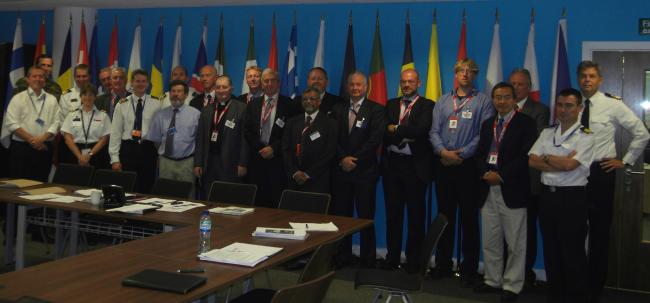Yesterday, Wednesday 25 August, EU NAVFOR Operational Headquarters (Northwood – UK) welcomed maritime industry representatives for its sixth “Industry Workshop”.
This was an opportunity for international shipping companies and various maritime organizations to exchange with EU NAVFOR feedback and ideas on the counter piracy responses in the Gulf of Aden and Somali Basin.
“You are our key partners”, said Colonel Richard Spencer, Chief of Staff of EU NAVFOR Operational Headquarters. “One of EU NAVFOR’s main tasks and issues is to protect vulnerable vessels. And we need your cooperation for that. The Best Management Practice (BMP) booklet should perhaps not be called “Best” Management Practice but “Minimum” Management Practice: self protection measures and ongoing vigilance remain, today, the most effective measures against piracy. However, there are, unfortunately, still some ships passing through the Gulf of Aden without applying the BMP measures or without being registered on the MSCHOA website. ”
The purpose of the BMP is to assist ships to avoid, deter or delay piracy attacks off the coast of Somalia, including the Gulf of Aden and the Arabian Sea. Experience, supported by data collected by Naval Forces, shows that the application of the recommendations contained within this booklet can, and will, make a significant difference in preventing a ship becoming a victim of piracy.
This document has been compiled by and with full participation and agreement of the 13 Industry Organisations who are signatories to it, as well as in full consultation with the combined efforts of – EU NAVFOR, the NATO Shipping Centre and the United Kingdom Maritime Trade Operations (UKMTO). As intelligence has been gathered and lessons learned evaluated, industry has been able to update and revise this guidance, which has been harmonised and coordinated by all concerned parties during the revision process.
Frank and open exchange of views and information made this meeting a productive and profitable conference for both maritime industry representatives and EU NAVFOR.
This was an opportunity for international shipping companies and various maritime organizations to exchange with EU NAVFOR feedback and ideas on the counter piracy responses in the Gulf of Aden and Somali Basin.
“You are our key partners”, said Colonel Richard Spencer, Chief of Staff of EU NAVFOR Operational Headquarters. “One of EU NAVFOR’s main tasks and issues is to protect vulnerable vessels. And we need your cooperation for that. The Best Management Practice (BMP) booklet should perhaps not be called “Best” Management Practice but “Minimum” Management Practice: self protection measures and ongoing vigilance remain, today, the most effective measures against piracy. However, there are, unfortunately, still some ships passing through the Gulf of Aden without applying the BMP measures or without being registered on the MSCHOA website. ”
The purpose of the BMP is to assist ships to avoid, deter or delay piracy attacks off the coast of Somalia, including the Gulf of Aden and the Arabian Sea. Experience, supported by data collected by Naval Forces, shows that the application of the recommendations contained within this booklet can, and will, make a significant difference in preventing a ship becoming a victim of piracy.
This document has been compiled by and with full participation and agreement of the 13 Industry Organisations who are signatories to it, as well as in full consultation with the combined efforts of – EU NAVFOR, the NATO Shipping Centre and the United Kingdom Maritime Trade Operations (UKMTO). As intelligence has been gathered and lessons learned evaluated, industry has been able to update and revise this guidance, which has been harmonised and coordinated by all concerned parties during the revision process.
Frank and open exchange of views and information made this meeting a productive and profitable conference for both maritime industry representatives and EU NAVFOR.
